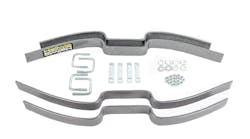Sometimes people, even big-time automobile designers and engineers, make mistakes. That is to be expected.
Often, the tendency is to cover up mistakes. However, doing so is a moral failure that usually only exacerbates the problem.
Take General Motors, by way of example. It let its faulty ignition switch defect “sit” for some 10 years.
In February, the company issued recalls for several of its vehicle models suspected of having a faulty ignition switch that automatically turns the car's engine off and prevents air bags from deploying – while the car is in motion. Nearly 3 million cars have been recalled.
The National Highway Traffic Safety Administration has said GM first discovered the defect in 2004.
With the long-time lapse before the recall, there is no longer the appearance of an honest mistake.
It Takes Courage
I want to use the incident to look at the powerful effect that occurs when large organizations work to silence their honest and hardworking employees.
How many people at GM, the vendor that supplied the ignition switch and GM dealerships knew about this problem? Of those, how many had the thought, however fleeting, that it is wrong to not take some kind of action?
Of course, during the period in question, GM went through the biggest reorganization since its then chief executive officer, Alfred Sloan, decided to do a little reorganization and house cleaning at GM in the 1930s.
Survival is a powerful motivator. But even after the government bailout of GM, how many people knew about the ignition issue?
Is it Happening Here?
I wonder what is going on within the equipment maintenance industry with regard to doing the right thing even when it is not the easy thing to do. How many maintenance people have held their tongues when they saw their company do something equally unethical?
How many maintenance professionals have actually done anything – for expediency or due to direct instructions – that went against their moral code?
Let’s look at the other big “maintenance” profession – medicine. If a doctor is faced with an ethical dilemma, who can he turn to if he wants an outside opinion?
Many hospitals have ethics committees. All medical societies have ethics interest groups. Doctors are even taught ethics in medical school.
If a maintenance person faces an ethical question, who does he turn to?
I can hear a giant silence. We have no one to turn to. We do not discuss ethics in equipment maintenance. We are not taught this.
We might even shun bringing ethics up in a public setting. After all, the things that are bothering us or that we object to are usually not certainties.
Some of these circumstances include: temporary repairs, doing the quickie repair, reusing used parts, modifying parts to fit, not referring to drawings, knowingly using sub-standard parts and using undersized wire, bearings, chain, etc.
A Worse Situation?
The dilemma might be worse. What if management never even told you to take a short cut and you did it out of a conviction that it was what was they wanted?
The implications and consequences give me a headache.
I would like for you to share with me any situations where you were told, or you thought – but were not directly told – that you “had” to take an unethical shortcut.
Not to worry. I will keep your name out of it.
Email your stories to me at [email protected].




